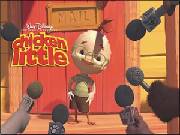|
|
||||
|
|
by John P. McCarthy  If it weren't standard operating procedure, Disney's saturation marketing campaign for Chicken Little would suggest the studio was worried about its box office prowess. Guess what? There was good reason for the Disney folks to be alarmed, even in this anemic movie year and on a weekend without much competition. The sky may or may not be falling in the animals-only hamlet of Oakey Oaks, but at the Mouse House, the bar for animated family films is clearly inching downward. Chicken Little has the distinction of being Disney's first animated film made exclusively on computer. That's its only distinction; moreover, it's a distinction without a difference. There's nothing remarkable about the look of the film, even when digitally projected, and if you’re not moving up in this respect, you're slipping backward. Besides, your average moviegoer doesn't care how a picture is made. What matters is the final product. Overall, Chicken Little does nothing to advance animated family films. In addition to the merely adequate visuals, there's nothing novel about how the fable concerning an apparently paranoid fowl is handled, the voice work is satisfactory, and only one character -- a pig named Runt of the Litter -- is memorable. The downbeat movie can't shake off the cruel consequences of the scrawny hero's (he wouldn't pass muster at Purdue, and Zach Braff's voice is unhelpfully generic) false alarm after being bonked on the head by a falling acorn. He upsets the angry residents of the town. The only one who believes in him is his smitten schoolmate, the homely duck Abby Mallard (Joan Cusack). Chicken Little's father, voiced by Garry Marshall, loses all faith in his unprepossessing son. He faces more public humiliation than his dad's disapproval. Branded the "crazy chicken," he becomes the butt of many jokes that take the form of billboards, websites, bumper stickers, and even a movie. And while the use of cutting-edge computer technology may be noteworthy, the first third of Chicken Little features old-fashioned cartoon sadism, especially when the popular kids at school square off against the unpopular ones (guess which side CL is on?) in a distastefully cruel dodgeball game. The plucky progeny quickly and miraculously redeems himself on the baseball diamond, where his father excelled, but the doom and gloom remains. During the final reel, the movie turns sci-fi when Chicken Little and pals Abby, Runt of the Litter, and a goldfish called Fish Out of Water thwart an alien invasion. There's both a structural randomness and predictability to Chicken Little, which has no personality or original idea driving it. The message that parents put excessive pressure on their children has resonance. In contrast, the movie's songs have very little. Steve Zahn's swishy, music-loving pig has some funny shtick and gets the biggest laugh when his irritated mother threatens to take away his Barbra Streisand collection. Most of the actors lending their voices don't have much to work with as the characters are hard to distinguish. Not until I read the press notes did I realize Don Knotts is part of the cast. And while I recognized the voices of Adam West, Catherine O'Hara, and Fred Willard, they pop up too late (West exclusively in yet another media parody) and feel wasted. It's often said kid's movies are aimed at adults, meaning they will enjoy them as much if not more than children. Chicken Little is aimed at adults in a much more direct way. Parents are relentlessly implored to believe in their kids no matter what. The degree to which this film, made by the team behind 2000's The Emperor's New Groove, is scrambled if not totally botched, reminds us that trust can always be misplaced. (Released by Walt Disney Pictures and rated "G" as suitable for all ages.) |
||
|
© 2026 - ReelTalk Movie Reviews Website designed by Dot Pitch Studios, LLC |



